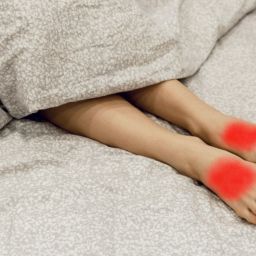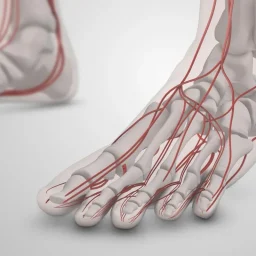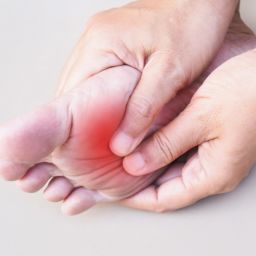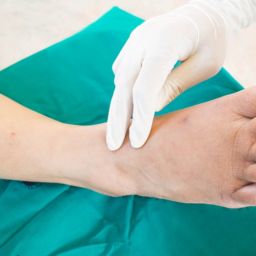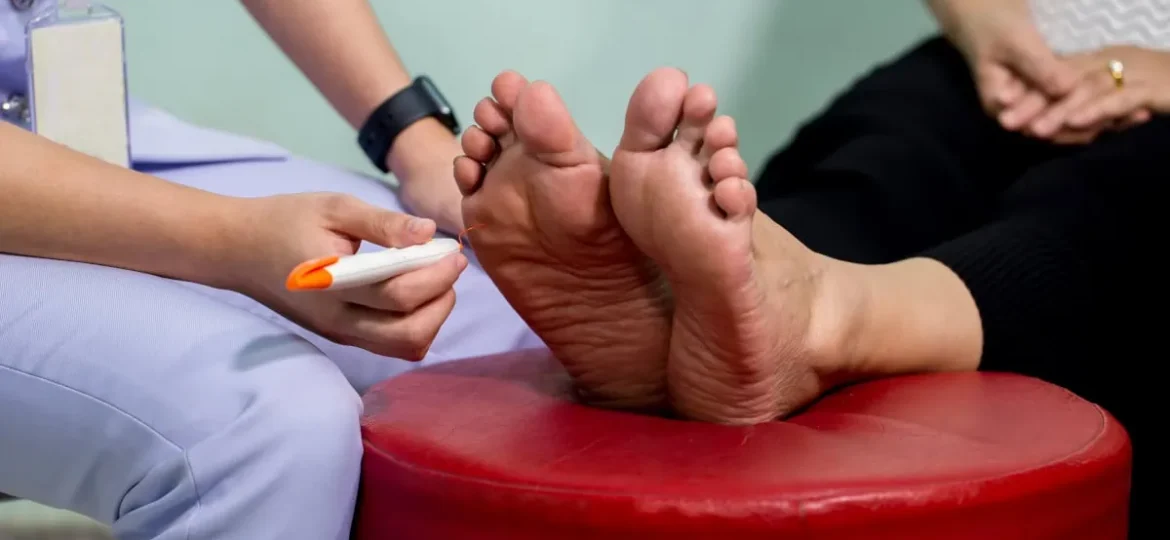
Experiencing numbness, tingling, or burning sensations in your hands and feet without a clear explanation can be both frustrating and concerning. When these symptoms arise from peripheral nerve damage with no identifiable cause, the condition is known as idiopathic neuropathy. At Certified Foot and Ankle Specialists, we understand the challenges of managing this complex condition and provide comprehensive care to help patients find relief.
Key Takeaways
- Idiopathic neuropathy affects the peripheral nervous system: This condition causes nerve damage in the hands and feet when no underlying cause can be identified, even after thorough testing
- Symptoms typically start gradually: Tingling, numbness, burning sensations, and muscle weakness usually begin in the feet and may progress to the hands over time
- Comprehensive diagnostic evaluation is essential: Proper diagnosis requires ruling out common causes like diabetes, vitamin deficiencies, and autoimmune conditions through blood tests, nerve conduction studies, and sometimes nerve and muscle biopsies
- Treatment focuses on symptom management: While the underlying cause remains unknown, various medications, physical therapy, and lifestyle modifications can significantly improve quality of life and reduce chronic pain
What is Idiopathic Neuropathy?
Idiopathic neuropathy, clinically known as chronic idiopathic axonal polyneuropathy (CIAP), is a form of peripheral neuropathy nerve damage that occurs without an identifiable underlying cause. The term “idiopathic” indicates that despite comprehensive diagnostic evaluation, no specific etiology can be determined. This condition primarily affects the peripheral nervous system—the network of nerves that transmits signals between your brain, spinal cord, and extremities. Patients typically present with sensory disturbances in the feet and hands, including numbness, tingling, burning sensations, and in some cases, muscle weakness. As your podiatrist, I want you to understand that while the cause may remain unknown, effective management strategies are available to help control your symptoms and maintain your quality of life.
How common is idiopathic neuropathy?
Idiopathic neuropathy is more prevalent than many patients realize. According to data from the National Institute of Neurological Disorders and Stroke (NINDS) and the Cleveland Clinic, millions of Americans are affected by some form of peripheral neuropathy. Of these cases, between 30 and 40 percent remain idiopathic after thorough diagnostic workup—meaning no underlying cause is ever identified. Chronic idiopathic axonal polyneuropathy specifically affects an estimated 5 to 8 million individuals in the United States. The condition becomes increasingly common with age, with prevalence rates reaching approximately 14 percent in adults over 40 and as high as 39 percent in those over 70 years of age. If you are experiencing unexplained numbness, tingling, or burning in your feet, know that you are not alone, and our team at Certified Foot and Ankle Specialists has extensive experience diagnosing and managing this condition.
Understanding How Symptoms Start
Symptoms typically begin in the toes and feet before potentially affecting the hands. This characteristic pattern occurs because longer nerve fibers are often affected first, and the nerves extending to your feet are the longest in your body.
Common Early Symptoms:
- Tingling or pins-and-needles sensations in the feet
- Numbness that gradually spreads upward from the toes
- Burning or sharp, shooting pain, especially at night
- Increased sensitivity to touch or temperature changes
- Loss of balance or coordination
Progressive Symptoms:
As the condition advances, you may experience muscle weakness in the affected areas, making it difficult to perform fine motor tasks or maintain stability while walking. Some patients also develop chronic pain that interferes with sleep and daily activities.
Diagnostic Process at Certified Foot and Ankle Specialists for Idiopathic Neuropathy
Diagnosing idiopathic neuropathy requires a thorough evaluation to rule out all known conditions that can cause peripheral neuropathy. Our comprehensive assessment includes:
Medical History Review:
We carefully examine your medical history, medications, family history of neurological conditions, and any potential exposures to toxins or infections that might explain your symptoms.
Physical Examination:
Our specialists perform detailed neurological examinations testing reflexes, muscle strength, sensory function, and coordination. We pay particular attention to the feet and lower extremities, where symptoms often first appear.
Laboratory Testing:
Blood tests help identify common causes of neuropathy, including diabetes (which can lead to diabetic polyneuropathy), vitamin B12 deficiency, thyroid disorders, kidney disease, and autoimmune conditions. We also check for heavy metal exposure and genetic markers for hereditary neuropathies.
Nerve Conduction Studies:
These tests measure how quickly electrical signals move through your nerves, helping identify which nerves are affected and the extent of damage.
Advanced Diagnostic Tools:
When necessary, we may recommend nerve and muscle biopsies or skin biopsies to examine nerve fiber density. These procedures provide detailed information about the type and severity of nerve damage.
Only after exhausting all diagnostic possibilities and finding no underlying cause can we confirm a diagnosis of idiopathic neuropathy.
Treatment Approaches for Symptom Management
While we cannot treat an unknown cause, effective management strategies can significantly improve your quality of life and reduce symptoms.
Medication Management:
Several medication classes help control neuropathic pain and discomfort. These include anticonvulsants that calm overactive nerves, antidepressants that modulate pain signals in the spinal cord, and topical treatments for localized symptoms. Our specialists work closely with you to find the most effective combination with minimal side effects.
Physical Therapy:
Targeted exercises help maintain muscle strength and flexibility, preventing atrophy and improving balance. Physical therapy also teaches proper foot care techniques and safe movement strategies to prevent falls and injuries.
Lifestyle Modifications:
Certain lifestyle changes can help manage symptoms and prevent progression. These include maintaining good foot hygiene, wearing properly fitted footwear with adequate cushioning, avoiding alcohol which can worsen nerve damage, and managing stress through relaxation techniques.
Pain Management Techniques:
Non-pharmacological approaches like transcutaneous electrical nerve stimulation (TENS), acupuncture, and massage therapy may provide additional relief for some patients with chronic pain.
Specialized Foot Care for Idiopathic Neuropathy Patients
Because idiopathic neuropathy often affects the feet first and most severely, specialized podiatric care is essential. Reduced sensation in your feet increases the risk of unnoticed injuries, infections, and ulcers that can lead to serious complications.
Daily Foot Inspection:
We teach patients to examine their feet daily for cuts, blisters, redness, or swelling. Using a mirror helps inspect the bottom of your feet and between your toes.
Proper Footwear:
Selecting shoes with adequate depth, cushioning, and support protects your feet from pressure points and injury. Custom orthotics may be recommended to redistribute pressure and accommodate any foot deformities.
Regular Professional Care:
Routine appointments allow our specialists to monitor your condition, trim toenails safely, remove calluses, and address any foot problems before they become serious.
Living with Idiopathic Neuropathy
Managing idiopathic neuropathy is a long-term commitment requiring patience and consistent care. While the condition may progress slowly over time, many patients maintain good quality of life through proper management.
Symptom Tracking:
Keeping a symptom diary helps identify triggers and patterns. Note when symptoms worsen or improve, and any activities or factors that seem to influence your condition. This information guides treatment adjustments.
Support Resources:
Connecting with support groups and counseling services helps many patients cope with the emotional challenges of living with a chronic condition. At Certified Foot and Ankle Specialists, we provide resources and referrals to help you build a comprehensive care team.
Ongoing Research:
Medical research continues to advance our understanding of peripheral nerve conditions. Some cases initially diagnosed as idiopathic neuropathy are later reclassified as new causes are discovered through genetic testing or other diagnostic advances.
When to Seek Immediate Care
While idiopathic neuropathy typically progresses gradually, certain symptoms warrant immediate medical attention:
- Sudden, severe weakness in the hands and feet
- Difficulty breathing or swallowing
- Changes in heart rate or blood pressure
- Loss of bowel or bladder control
- Rapidly progressing symptoms
- New foot wounds or signs of infection
These symptoms may indicate a more serious neurological condition requiring urgent evaluation.
Expert Care at Certified Foot and Ankle Specialists
At Certified Foot and Ankle Specialists, our board-certified podiatrists have extensive experience managing idiopathic neuropathy and other conditions affecting the peripheral nervous system. We utilize the latest diagnostic technologies and evidence-based treatment approaches to provide comprehensive care tailored to your individual needs.
Our multidisciplinary approach includes collaboration with neurologists, pain management specialists, and other healthcare providers to ensure you receive coordinated, comprehensive care. We’re committed to helping you maintain mobility, reduce discomfort, and prevent complications associated with nerve damage in your hands and feet.
Conclusion
Idiopathic neuropathy presents unique challenges because its cause remains unknown despite thorough investigation. However, this diagnosis doesn’t mean you’re without options. Effective symptom management, specialized foot care, and ongoing monitoring can help you maintain your quality of life and prevent complications.
If you’re experiencing unexplained numbness, tingling, or pain in your feet, don’t wait to seek evaluation. Early diagnosis and treatment of peripheral neuropathy—whether idiopathic or from an identifiable cause—leads to better outcomes and prevents progression of nerve damage.
Contact Certified Foot and Ankle Specialists today to schedule a comprehensive evaluation. Our experienced team is ready to help you understand your symptoms, explore treatment options, and develop a personalized care plan that addresses your unique needs and concerns. WE have local foot clinics in Boca Raton, Boynton Beach, Tampa, and the Fort Myers region. For online instant appointment scheduling to see a foot doctor near you, click the button below or click here.
Medical Disclaimer: This article is for informational purposes only and does not constitute medical advice. Always consult with qualified healthcare providers for diagnosis and treatment of medical conditions. Certified Foot and Ankle Specialists provides comprehensive evaluations and personalized treatment plans based on individual patient needs.
*About the Author: Dr. Kyle J. Kinmon, MS, DPM, FACFAS
This article was reviewed by a board-certified podiatrist with over 15 years of experience in diagnosing and treating foot and ankle conditions. Our practice specializes in comprehensive foot care, from common conditions like tendonitis to complex surgical interventions.
Frequently Asked Questions About idiopathic neuropathy permanent
Q: Is idiopathic neuropathy permanent?
A: While idiopathic neuropathy is typically a chronic condition, the prognosis is generally good with proper management. Symptoms can often be controlled
effectively, and many patients maintain good quality of life. The condition typically progresses slowly or may stabilize over time.
Q: How common is idiopathic neuropathy?
A: Idiopathic neuropathy accounts for approximately 20-30% of all peripheral neuropathy cases, affecting an estimated 5-8 million Americans. The condition becomes more common with age, affecting up to 39% of adults over 70.
Q: What medications are used to treat idiopathic neuropathy?
A: Common first-line medications include gabapentin (Neurontin), pregabalin (Lyrica), duloxetine (Cymbalta), and tricyclic antidepressants like amitriptyline
and nortriptyline. Your podiatrist or neurologist will determine the best option based on your specific symptoms.
Q: What is the difference between small fiber and large fiber neuropathy?
A: Small fiber neuropathy affects thin nerve fibers that transmit pain, temperature, and autonomic signals, causing burning pain and temperature
sensitivity. Large fiber neuropathy affects thicker nerves responsible for vibration sense and proprioception, causing numbness and balance problems.
Many patients have both types.

